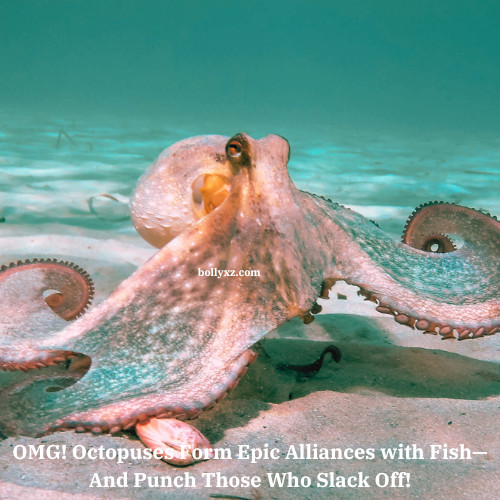In the waters of the Red Sea, fish and octopuses are forming an alliance that isn’t going away: They’re joining forces to track down their prey, setting up a hunting operation that’s potentially more powerful than each creature running alone.
With the octopus in the lead, the fish seek out hidden prey and signal where to snag a smaller fish or mollusc. But if freeloading fish are flying around, looking to benefit from the hunt without contributing, the octopus chases them away, according to new research.
Octopuses Form Epic Alliances with Fish
According to Eduardo Sampaio, a researcher at the Max Planck Institute for Animal Behaviour and lead author of the study, the octopuses play an important role as a selection maker within the group News’ Helena Kudiabor.
The study, published Monday in Nature Ecology & Evolution, brought to light a new kind of collective behaviour. The octopuses, which are usually solitary, were responsible for the diffusion of fish species, determining who cooperated and who did not.
“No one knew that octopuses had this cutting-edge social existence, not with other octopuses, but with other species,” study co-author Iain Couzin, an evolutionary biologist and director of the Max Planck Institute for Animal Behavior, tells Popular Technology’s Lauren Laffer.
Sampaio and his team collected about 120 hours of underwater photography during dives in the Red Sea. They filmed thirteen scenes showing a massive blue octopus (Octopuses cyanea) hunting rare fish species. And the different animals seemed to have distinct roles in the operation.
“These fish function as an extensive sensory system for the octopus,” Sampaio tells Vice’s Mirjam Guesgen. “The octopus can taste or explore the environment just by looking at them.”
One of the octopus’ biggest helpers was a species of fish called the blue goatfish (Parupeneus cyclostomus), which had strong team-searching abilities. They can discover new crevices and show the octopus where to find prey by hovering over the spot or moving from crevice to octopus and back again.
“If the group moves, everyone is happy. Everything is fine,” Sampaio tells National Geographic’s Melissa Hobson. Sometimes, other species of fish — usually blacktip groupers (Epinephelus fasciatus) — weren’t as helpful and seemed to be waiting for others to do the work. In these cases, they got a jab from the octopus.
But it wasn’t just the octopus that became the controlling member of the group: Some fish could also displace others by quickly approaching them. The fish didn’t show any aggressive movements toward the octopuses, according to the article, suggesting that the cephalopod was the dominant individual. The octopus seemed to decide whether or not the group could move to a new area. The octopus captures the hidden prey by wrapping its body around the rock while the hunting group locates it. This is a common hunting behaviour for the big blue octopus, but while chasing prey alongside fish, the cephalopod performs this wrapping action fewer times, the team found, presumably saving energy.
By gaining deeper insights into the animals’ collective movements, researchers can help conserve other species, Marina Papadopoulou, a computational biologist at Swansea University in Wales who was not involved in the study, tells The New York Times’s Elizabeth Preston.
However, the images did not show whether the humans in the hunting group remained constant. For future studies, Sampaio and his team intend to analyse whether the animals understand each other, which could also improve interaction.
Does this octopus choose to hunt with blue mullets as standard or does it prefer to hunt with Martha, a professional hunter, instead of Steve, who is lazy? The researchers have another hole they’ve been trying to fill: It’s difficult to determine the advantage each species gets, or, more specifically, who is gobbling up the prey.
They assume that the octopus receives the greatest reward when it hunts in a group rather than alone. Based on the New York cases, some fish can capture prey that manages to elude the octopus, but they are not sure whether each fish receives equal portions.
For other scientists, like Hannah MacGregor, a researcher of marine animal behaviour at the University of Cambridge in England, the work is already “definitely fascinating,” she tells Nature News, and allows researchers to better understand “what would compel, in this case, completely different groups of species to stay together.”

